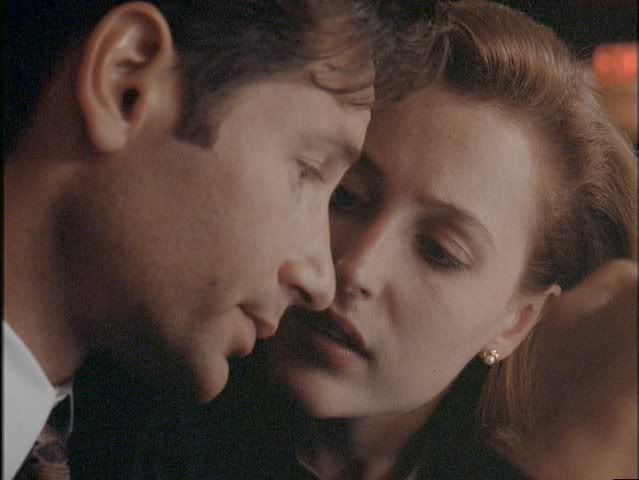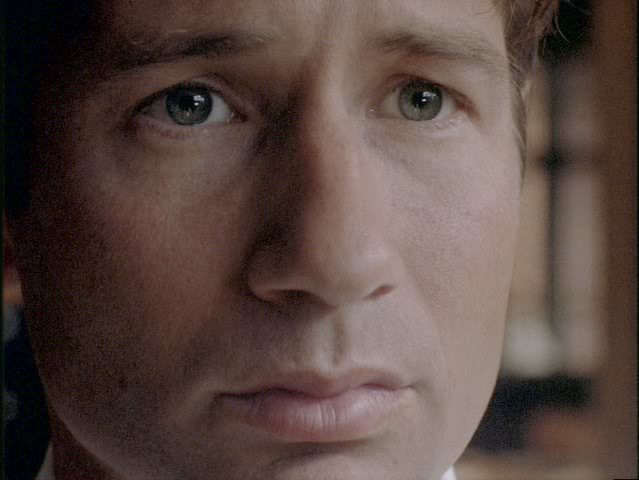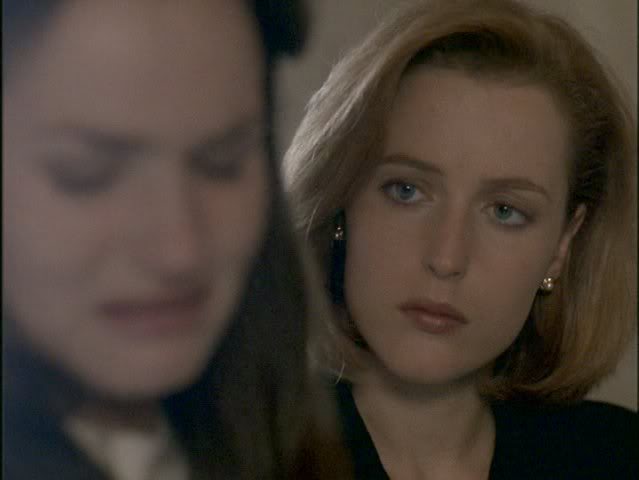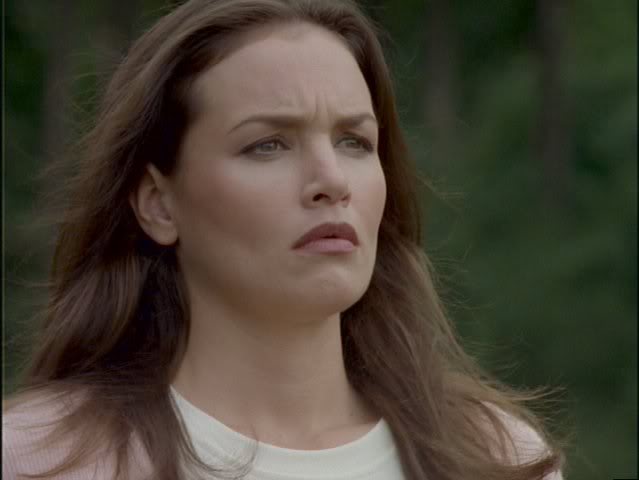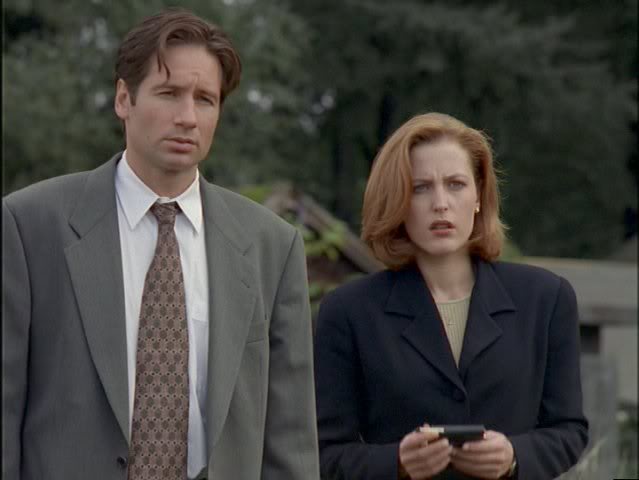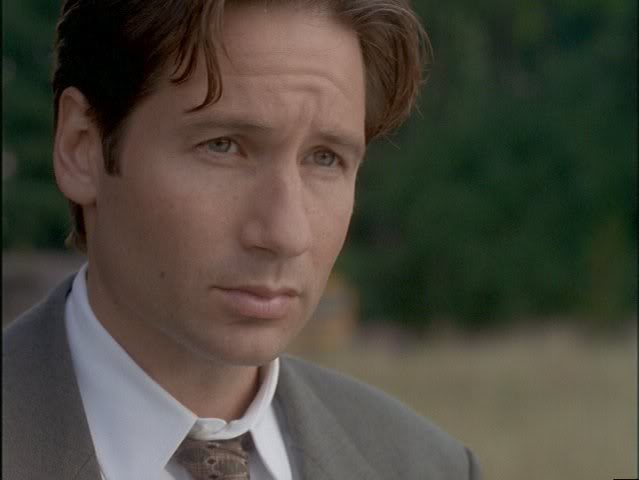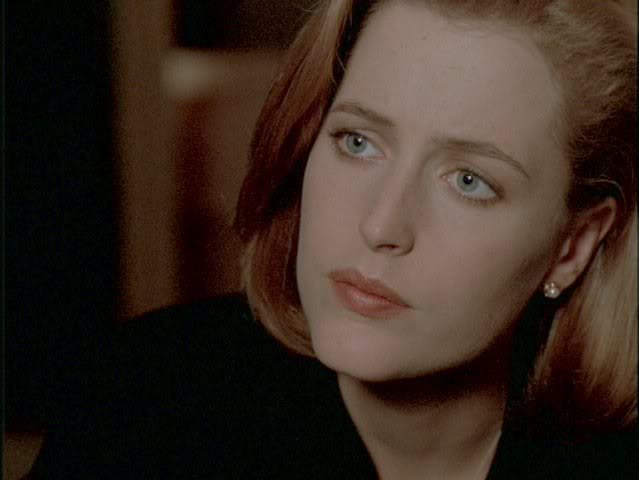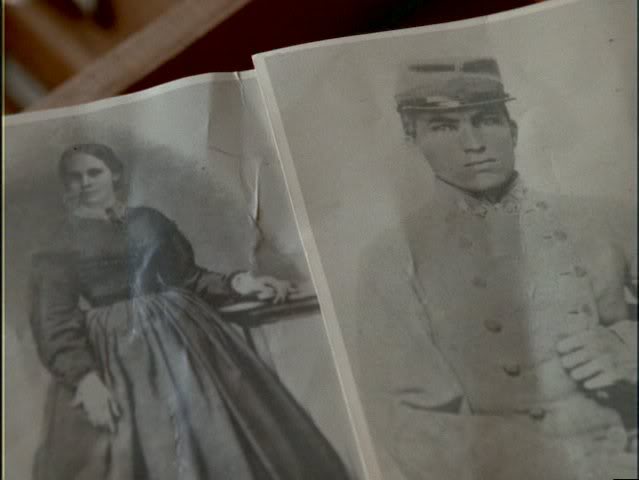CTP Episode of the Day - 10.09.06 - The Field Where I Died
Today's Cherished Episode: The Field Where I Died (4x05)
Original Air Date: November 3, 1996
Written By: Glen Morgan and James Wong
Directed By: Rob BowmanIn an effort to prevent a mass suicide at a fanatical religious cult, Mulder and Scully interrogate one of the wives of the polygamous cult leader. Under hypnosis, her accounts of her past lives -- and deaths -- are inexplicably tied to the agents' own.
MULDER: Dana, if, um ... early in the four years we've been working together ... an event occurred that suggested or somebody told you that we'd been friends together in other lifetimes ... always ... wouldn't it have changed some of the ways we looked at one another?
SCULLY: Even if I knew for certain, I wouldn't change a day. Well, maybe that Flukeman thing. I could've lived without that just fine.
Some "The Field Where I Died" Tidbits & Musings:
-- After returning to The X-Files in Season 4, Morgan and Wong did "Home," then completed their first script for Millennium, then returned to The X-Files for The Field Where I Died, an emotional and, for Mulder and Scully, intensely personal episode which for the writing duo felt like the third part of a trilogy that began with "Beyond the Sea" and continued into "One Breath," stories where the paranormal directly affected the lives, past and present, of the show's lead characters.
-- "It was my favorite episode," Glen Morgan said. "I was so pleased with the way it came out. For personal reasons, 'The Field Where I Died' meant everything to me." Did Morgan have a personal belief in the theory of reincarnation, karmic or otherwise? "I don't believe in past lives per se," he said, "but I believe in past lives in this life. That you can be in a position to go, 'Jeez, my life is s--t,' or 'It's not happening for me,' and then something comes along where you're kind of reborn. That's what the episode meant to me."
-- Morgan also enjoyed the conceit of having Mulder the last to catch on to what was happening to him. "In most episodes, Mulder knows before anybody else what the paranormal thing is," he said. "He's two steps ahead of everybody. In this one, the case just drops into his lap, and he's the last to figure it out."
-- In addition to relishing the opportunity to do something different with The X-Files, both Morgan and Wong agree that their episodes have often been inspired by the show's lead actors. "The Field Where I Died" was written to give David Duchovny something more to do than spout theories. "David said, 'I haven't had a show where I really kind of cut loose, you know -- I'm doing a lot of exposition,'" recalled Morgan. "So we tried to write an episode to meet that creative challenge."
-- Although Shirley MacLaine, David Koresh, and Jim Jones were standing just out of camera range, the real creative godfather of this episode, besides Duchovny, was Ken Burns, the creator of the PBS documentary series The Civil War. The wartime romance between Sullivan Biddle and Sarah Kavanaugh -- Mulder and Melissa Ephesian in their supposed former lives -- was inspired by the touching letters from Major Sullivan Ballou, a Union officer, and his wife, Sarah, that were a highlight of Burns's documentary.
-- In one of his letters Ballou assured his wife that his love for her was "deathless" and that even though he might be killed in the War, he would always be with her, he would wait for her, and that "we shall meet again." One week after writing the letter, Ballou was killed in the First Battle of Bull Run. Although his references in the letter most likely refer to the two being reunited in heaven, they can also be interpreted as meeting in another life, the subject explored in this episode.
-- "The Ballou letter was one of Glen's favorite parts of the miniseries," said Kristen Cloke, who should know. Not only was Cloke the principal guest star in the episode, at the time she was Glen Morgan's fiancée (and would become his wife on June 13, 1998). She was also, like many of the leading actors in Morgan and Wong's fourth-season offerings, a star of their former series Space: Above and Beyond. She played Lieutenant Shane Vansen in that series, and in one memorable episode played pool with an android named Handsome Alvin (a cameo by David Duchovny).
-- Glen Morgan listened to the soundtrack to the Ken Burns miniseries The Civil War over and over again while he wrote this episode.
-- Although the writing credit went to both Glen Morgan and Jim Wong, it was generally believed that Glen Morgan did most of the writing on this episode (while Jim Wong was doing most of the writing on Millennium. But like Lennon and McCartney, they generally shared the writing credits no matter what.
-- Timeline: This episode is set shortly after November 5, 1996 -- the time found on Sidney's first recorded message to the ATF.
-- Mulder's soliloquy at the beginning and end of the episode is from a long Robert Browning poem titled "Paracelsus." Apparently, it was Jim Wong's suggestion to bookend the episode with the poem: "I, too, have spent a life the sages' way and tread once more familiar paths. Perchance I perished in an arrogant self-reliance an age ago ... and in that act, a prayer for one more chance went up so earnest, so ... instinct with better light let in by death that life was blotted out not so completely ... but scattered wrecks enough of it to remain dim memories ... as now ... when seems once more ... the goal in sight again."
-- Kristen Cloke did her own research on multiple-personality disorders before filming started, and based each of her several personae on people in her own life. As was evident to even the most casual of viewers, acting the part of such a disturbed woman was an intense process. "All her switching from one personality to another was provoked by sadness," said Cloke. "You have to be incredibly sad to run away from yourself like she did."
-- Michael Massee (Vernon Ephesian) had a supporting role in Playing God, the feature film starring David Duchovny that was released in the fall of 1997. "I played a kind of quirky FBI agent," he said with a chuckle. Massee played Funboy in the movie The Crow and was inadvertently responsible for shooting and killing the film's star, Brandon Lee, in an on-set accident while filming a scene for the movie.
-- Vernon Ephesian, the character likened to cult-leader David Koresh, bears Koresh's real first name, Vernon. His last name was taken from the book of the Bible.
-- For the role of Ephesian, said Massee, he tried to make the cult leader as normal-looking and non-demonic as possible. "The whole basis of that performance was to be understated -- to be the guy next door," he said. "You have to believe that he believed his own rap. When he speaks, he's just explaining that 'this is the way it is' -- and that's when it gets very scary."
-- A scare of a different sort was experienced when editor Heather MacDougall put together her first cut of the episode. At more than an hour long, "The Field Where I Died" set an unofficial X-Files record (up to that time) for excess length. In order to make room for the commercials, a full 18 minutes had to be painfully excised: onto the digital equivalent of the cutting-room floor went two entire personalities of Melissa. Also lost was most of a third -- the little girl Lily, who floated to the surface only briefly.
-- The scenes highlighting two of Melissa's personalities/past lives that were cut from the final edit can be seen on the Season 4 DVDs. In the first, Melissa saw a cigarette in her hand and suddenly froze. Mulder recognized the fact that her personality had changed (she had become a young girl - perhaps Lily) and took the cigarette from her, asking how she got his cigarette. He put it to his lips, she told him he needed to stop that nasty habit, and he snubbed it on the ground. Mulder, Scully, and Melissa prepared to get in the SUV to go to the Temple and Melissa (as the little girl) said she wanted to ride up front with Mulder. By-the-book Scully told her that Federal regulations required that she ride in the back, but Melissa said she would get sick and started to throw a tantrum. In the next scene, Melissa was seated up front and Scully in back. RoadRage!Mulder yelled at a car that pulled out in front of him, and Melissa changed to yet another personality/past life, someone named Joe-bee with an accent (a "sadistic erudite Hepburnish tone" it said in the script) who spewed some rather disgusting dialogue about death and decay.
-- Another scene also cut from the final version of the episode featured Mulder and Scully racing back toward the compound (after they determined the group was going to commit suicide). As they drove, Scully saw a sign reading "Kavanaugh Road," and another reading "Sullivan Field," and told Mulder that he must have subconsciously processed the names that he saw on the signs and that was how he knew of their past existence (thus implying that his reincarnation memories recovered during hypnosis were all a bunch of hooey). Probably a good idea that that scene was excised.
-- To create the Waco-like Temple of the Seven Stars, the Vancouver production team made the relatively rare decision to build it all on a soundstage at their home base, North Shore Studios. Art director Gary Allen, for one, thought it was the most expensive in-studio set the series had ever constructed.
-- Editing goof: When Mulder gives Melissa the picture from the Civil War he is caressing her hand. When her husband barges through the door, the camera shows the shot with Mulder and Melissa with his hand on the tape recorder. When it cuts back to the previous shot, he is still touching her hand.
-- Morgan and Wong scripts are notorious for paying little or no attention to mundane particulars, and this one is no exception. For instance, in his hypnotic state Mulder describes a Gestapo officer as being the Smoking Man's previous incarnation at a time when the Smoking Man would most certainly have been alive in his current incarnation. Also during his hypnotic state, Mulder said that Melissa was his Jewish husband in the Polish ghetto, yet one of Melissa's past lives, Sidney, is a snitch under the Truman administration only a few years later.
-- To provide verisimilitude for Scully's county courthouse scenes, props master Ken Hawryliw contacted local officials in the real town of Apison, Tennessee -- about an hour's drive east of Chattanooga -- who sent him an actual citizen's registry from the Civil War period. It was reproduced by the props department with the aid of an expert calligrapher. The photographs of Sullivan and Sarah -- which at first, second, and even third glance seem to be daguerreotypes of Duchovny and Cloke -- were actually public-domain photographs copied from books of the period. "They were hybrids," said Hawryliw. "We took the clothing from one picture, the face from another. It was a very good job of computer melding, and you really couldn't tell what we did. The man whose face we used, in particular, looked so much like Mulder it was uncanny."
-- After all that hard work, Scully was lucky that the county courthouse was open at 4:12 a.m., and that everything was so conveniently labeled.
-- To stimulate the proper mood for Melissa's death scene, composer Mark Snow "sampled" a recording of Gregorian chants.
-- Events of the present had many ways of intruding on historical reveries. The fact that the Heaven's Gate tragedy occurred less than six months after the episode aired produced some over-heated calls from the press to Chris Carter, who understandably declined to comment.
-- Another type of question was posed by many fans: Was the fact that Mulder and Scully were always friends, not lovers, in their past lives a way to explain why in the current incarnations their relationship hadn't blossomed into romance? Adhering strictly to the X-Files Rule of Ambiguity, none of the writer-producers were willing to commit themselves one way or another.
-- Of course, Morgan and Wong had their own take on that issue. Like many of the show's fans, they felt that the Mulder/Scully relationship had not developed significantly during the third season. They felt that Mulder and Scully seemed, for the most part, like a long-married couple so used to each other that neither held any further surprises for the other. So they sought to address that trend in "The Field Where I Died" (also in "Home" and most notably in "Never Again"). For example, during the episode, Scully confronts Mulder and accuses him of being responsible to no one but himself. "Mulder is so out there with his theories, so obsessive with his quest," said Wong, "it seemed like Scully was the only thing that was holding him down, in the sense of being his anchor in reality. And we felt like maybe Scully needed to do something where she said, 'You know what? I'm not here just for you. I have my own life.'" Yet later in the episode, in typical Morgan and Wong fashion, they have Scully confirming that she "wouldn't change a day" of the time she has known Mulder.
-- During the "wouldn't change a day" scene, in addition to being the first time that Mulder called Scully "Dana" since Season 1, it was also the first time that either had spoken of their working relationship in terms of a friendship -- for the reticent Mulder and Scully, "it was tantamount to a declaration of love," said the writers.
-- One of the kids from the Temple of Seven Stars was actually played by triplet brothers Isaac, Jeremy, and Oliver Wildsmith. The boys also played young Teddy Holvey in the Season 2 episode, "The Calusari."
-- Once & Future Retreads: Doug Abrahams (Harbaugh) was a Patrolman in the "Pilot," Agent #2 in "Gender Bender," Paul Vitaris in "Die Hand Die Verletzt," and Lt. Neary in "Hell Money." Michael Dobson (BATF Agent) was a Marksman in "Duane Barry," Sergeant Hynek in "Jose Chung's From Outer Space," and a U.S. Marshall in "Kitsenugari." Anthony Harrison (Agent Riggins) was the Fourth Man in "Conduit" and an MTA Officer in "Sleepless."
-- I know of many shippers who were so disgusted with this episode that they never watched it again and always include it on their "least favorite" list. But IMBO, you don't know what you're missing. First of all, it's a poignant, romantic, yet heartbreaking episode. It's one of the most visually stunning episodes of the show you'll ever see. The musical score by Mark Snow is breathtaking. The performances -- particularly by Cloke, Duchovny, and Mitch Pileggi -- are top-notch. And there's some great character development which I believe only reaffirms the special bond that Mulder and Scully share; I mean, when your souls are entangled throughout eternity, you can't get much more "together" than that.
-- And for those who felt "The Field Where I Died" meant that Mulder and Scully would never get together romantically, no matter how many times their lives intertwined, you obviously forgot that this was a stand-alone episode, which meant that it would never be referred to again. As you should have learned by the time "The Field Where I Died" aired -- if a major character development does not happen in a "mythology" episode, it didn't happen at all; and sometimes, not even then.
-- About "The Field Where I Died," Gillian Anderson said, "I loved that script. It made me cry. And the concept of Mulder and Scully meeting in a past life -- it's something that, for once, I'd truly love to believe."
(Thanks to chrisnu for today's pics.)
Please share your first impressions, favorite (or cringe-worthy) moments, classic lines, favorite fanfic, nagging questions, repeated viewing observations, etc., as today we celebrate "The Field Where I Died"!
Polly
